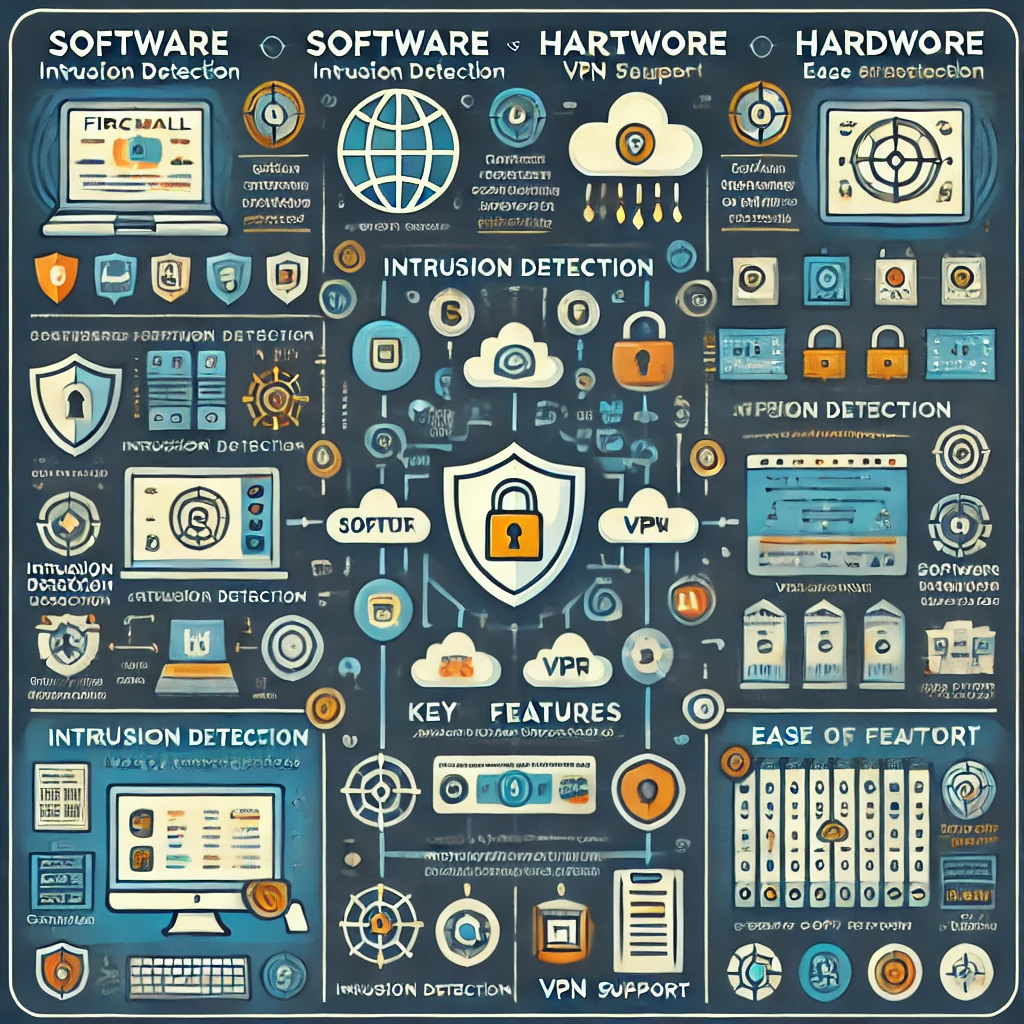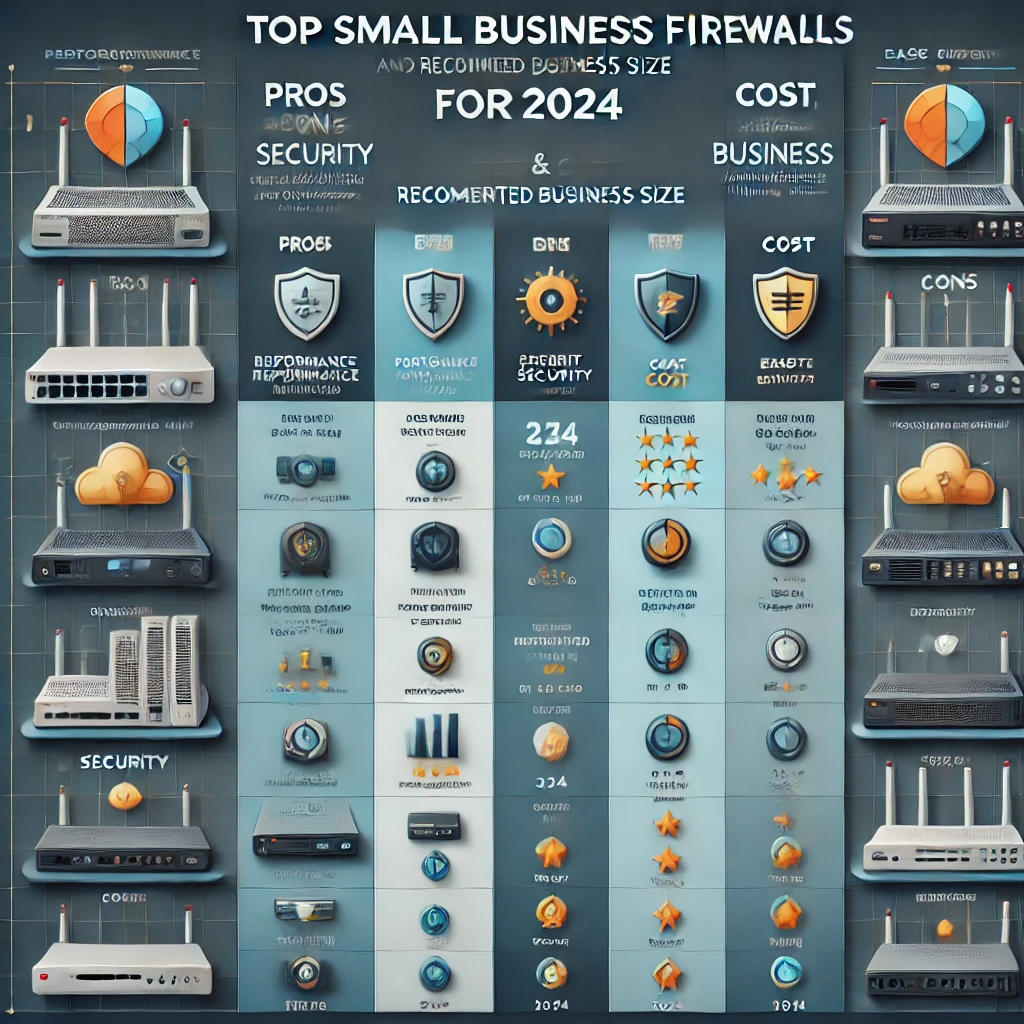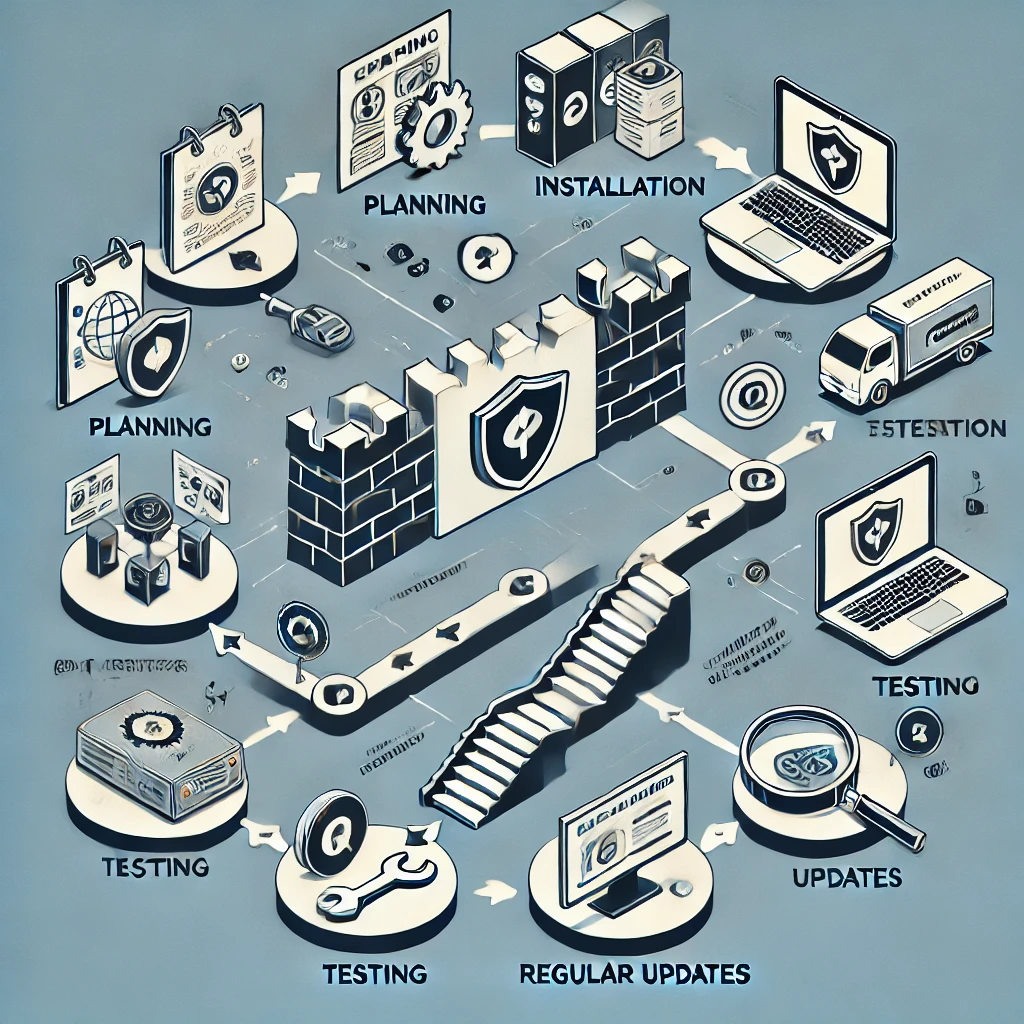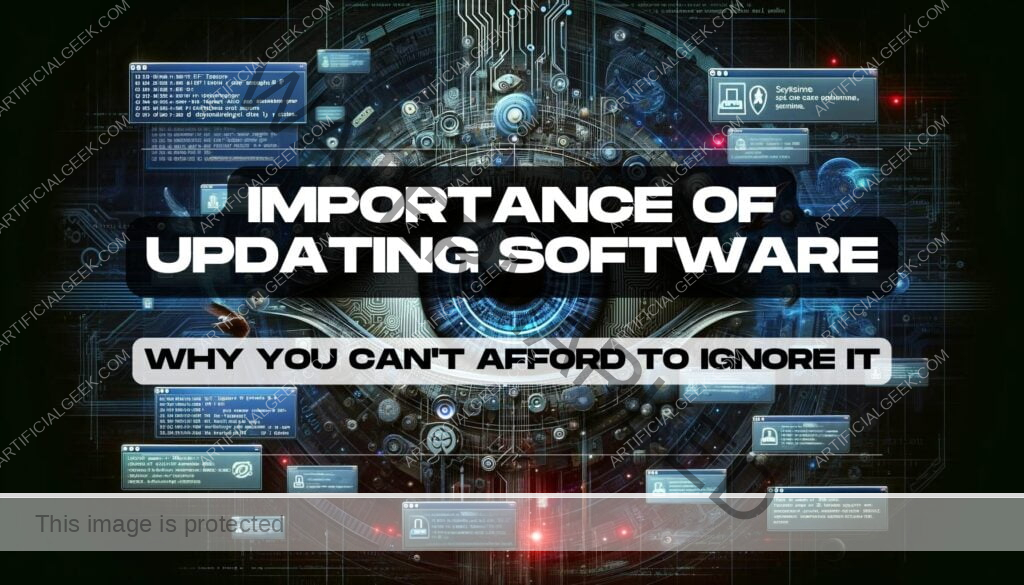In today’s rapidly digitizing world, securing your small business against cyber threats has never been more crucial. Firewalls—think of them as the sentinels standing guard at the gates of your digital domain—are your first line of defense. Choosing the best firewall for small business isn’t just a technical decision; it’s a strategic move that safeguards your data, protects your transactions, and ensures uninterrupted service to your customers.
Now, if you’re picturing a high-tech war room where seasoned cybersecurity experts monitor screens filled with complex graphs, let’s dial it back. In reality, the right firewall solution for a small business can be both accessible and manageable. Whether you’re a local bakery owner keeping customer payment data safe, or a burgeoning tech startup shielding innovative ideas, the importance of robust cybersecurity remains the same.
Navigating the maze of available firewall solutions might seem daunting at first. With terms like intrusion detection, VPN support, and threat management, where do you even begin? And how do you balance cutting-edge security with cost-effectiveness? These are not just pertinent questions—they’re the very challenges we’ll tackle head-on.
As we delve deeper into what makes a firewall not just good, but great for small businesses, we’ll explore the essential features that you should look for, review some of the top contenders in the market today, and provide practical advice on how to set up and maintain your cybersecurity shield. So, let’s march forward, equipped with knowledge and ready to turn the complexities of cybersecurity into streamlined, strategic decisions that propel your business forward.
Understanding Firewalls
In your quest to find the best firewall for small business, it’s crucial to start with the basics. So, what exactly is a firewall? In the simplest terms, it’s a barrier or shield designed to protect your computer networks from unauthorized access or malicious threats. But not all firewalls are created equal, and understanding the distinctions is key to choosing a protector that’s tailor-made for your business needs.

The Two Guardians: Software and Hardware Firewalls
Primarily, firewalls fall into two categories: software and hardware. A software firewall is a program installed on each computer and it regulates traffic through port numbers and applications. It’s particularly adept at controlling outgoing traffic, ensuring that sensitive data doesn’t slip through the cracks. On the other hand, hardware firewalls sit between your network and the gateway to the internet—literally a physical barrier that manages incoming traffic from the internet to your private network. For many small businesses, the combination of both delivers a robust defense, layering protection in a way that one alone cannot achieve.
Core Features of a Stellar Small Business Firewall
When considering the best firewall for your small business, you’ll want to look for a few essential features:
- Intrusion Detection and Prevention: This goes beyond simple monitoring; it actively seeks out potential threats and acts to block them.
- VPN Support: Especially crucial if you or your employees need remote access, a VPN keeps your data safe even when you’re not in the office.
- Traffic Filtering: This ensures that only legitimate traffic reaches your network, blocking unwanted or harmful data.
- Ease of Use: You need something straightforward to manage, without needing a PhD in IT.
Understanding these features helps demystify what might initially seem like a complex decision. It’s not just about buying a piece of technology. It’s about investing in a system that acts as the steadfast guardian of your digital assets, tailored to the unique rhythms of your business operations.
As we transition from the theoretical to the practical, let’s take a closer look at some of the top firewall solutions currently on the market. By comparing their features, costs, and real-world performance, we can pinpoint exactly which firewall will serve as the most reliable sentinel for your small business.
Top Firewall Solutions
Having unpacked what makes a firewall crucial and the features to look for, let’s dive into some of the top firewall solutions that stand out for small businesses in 2024. Selecting the best firewall for small business isn’t just about picking a product—it’s about finding the right fit that complements your unique business needs and cybersecurity demands.

A Comparative Look at Leading Small Business Firewalls
1. Fortinet FortiGate
- Strengths: Known for its high performance and integrated security services, including advanced threat protection and intrusion prevention systems.
- Ideal for: Businesses looking for comprehensive security features bundled into one device.
2. Cisco Meraki MX
- Strengths: Offers cloud-managed security, which simplifies the configuration and management for businesses without a dedicated IT department.
- Ideal for: Small businesses aiming for ease of use with the flexibility of remote management.
3. WatchGuard Firebox T Series
- Strengths: Provides robust security measures with a focus on scalability and detailed reporting.
- Ideal for: Growing businesses that anticipate scaling their operations and require a firewall that can grow with them.
4. Sophos XG Firewall
- Strengths: Excellent at integrating with other Sophos security products, offering a synchronized security solution.
- Ideal for: Businesses looking for seamless integration with existing Sophos environments or those who prioritize unified threat management.
Each of these solutions offers a unique blend of features, but they all ensure that your business’s digital perimeter is well-guarded. When evaluating these options, consider not only their specifications but also their usability, support, and scalability to ensure they align with your business’s long-term security strategies.
Making the Smart Choice for Your Business
Deciding on the best firewall for your small business involves weighing these options against your specific needs. Do you require a solution that offers simplicity and user-friendliness, or is a more robust and scalable system necessary to support a rapidly growing business? Perhaps cost is a driving factor, or maybe you need something that integrates seamlessly with your existing IT infrastructure.
As we shift our focus from the top solutions available to how you can set up and maintain your chosen firewall, keep these questions in mind. The right choice will not only protect your business but will also provide peace of mind, knowing that your network is secure from external threats. Let’s move forward, ensuring your digital assets are as secure as they can be, setting you up not just for security, but for success.
Installation and Maintenance
Choosing the best firewall for small business is just the first step. Proper installation and regular maintenance are pivotal to ensure that the firewall continues to serve its purpose effectively. Let’s break down what you need to know to get your firewall up and running, and how to keep it in tip-top shape.

Step-by-Step Firewall Installation
1. Planning Your Network Layout
- What to Do: Before you even unbox your new firewall, plan your network layout. Consider where the firewall will physically sit and how your network cables will connect.
- Pro Tip: Use a network diagram tool to visualize your setup. This helps in identifying potential bottlenecks and ensuring optimal placement for your firewall.
2. Configuring Your Firewall
- What to Do: Configuration might be the most technical step. Set up basic security settings, such as rules for inbound and outbound traffic, and enable features like intrusion prevention and VPN access.
- Pro Tip: Many firewall vendors offer configuration wizards or templates tailored for small businesses, which can simplify this process considerably.
3. Testing the Firewall
- What to Do: After setup, test your firewall by simulating both normal traffic and potential security threats.
- Pro Tip: Engaging in regular penetration testing and vulnerability scans can help you understand if your configurations are holding up against potential attacks.
Ongoing Maintenance to Keep Your Firewall Robust
Regular Updates
- Why It Matters: Like any piece of technology, firewalls need regular updates to ensure they are protected against the latest threats.
- How to Do It: Enable automatic updates if available, or set a schedule to manually update your firewall software.
Performance Monitoring
- Why It Matters: Monitoring helps detect issues before they become serious threats.
- How to Do It: Use your firewall’s built-in analytics tools to monitor traffic and detect unusual patterns that could indicate a breach.
Policy Review and Adjustment
- Why It Matters: As your business grows, your security needs will evolve.
- How to Do It: Regularly review and adjust your firewall’s rules and policies to ensure they continue to meet your business’s changing needs.
These steps not only help in setting up your firewall but also ensure that it remains a formidable barrier against cyber threats. Moving forward, understanding the financial implications of your cybersecurity choices is also crucial. So, let’s shift our discussion to explore the cost-effective firewall solutions that balance budget constraints with robust security needs.
For more detailed strategies on securing your systems, check out our Cybersecurity Tips Windows 10: Ultimate Guide for Safeguarding Your System in 2024.
Cost Analysis
Navigating the costs associated with choosing the best firewall for small business can seem like a balancing act between financial prudence and optimal security. Every dollar counts in small business, and investing in cybersecurity is no exception. Let’s break down the expenses and uncover ways to achieve robust protection without breaking the bank.
Initial Investment vs. Long-Term Benefits
Purchase Price
- Overview: Firewalls come with a wide range of price tags, from affordable software options to more substantial hardware investments.
- Consideration: While it might be tempting to go for the cheapest option, consider the long-term effectiveness and security features. Remember, the best firewall is one that offers comprehensive protection tailored to your specific needs.
Installation Costs
- Overview: Depending on whether you choose a software or hardware firewall, installation costs can vary. Hardware setups might require professional installation.
- Consideration: Sometimes, spending a bit more upfront on professional setup can save you from costly security breaches and technical headaches down the line.
Ongoing Operational Costs
Maintenance and Updates
- Overview: Keeping your firewall up-to-date is crucial for protecting against the latest threats.
- Consideration: While some systems offer free updates, others may require a subscription for ongoing support and advanced features. Factor these into your budget.
Energy Consumption
- Overview: Particularly relevant for hardware firewalls, the energy cost can impact your monthly utility bills.
- Consideration: Investing in energy-efficient models can reduce long-term operational costs.
Return on Investment (ROI)
- Calculating ROI: Consider not just the immediate financial outlay but also the potential cost savings from avoiding data breaches and downtime. Effective firewalls can prevent financial losses far exceeding their initial and ongoing costs.
- Pro Tip: Regularly assess the performance of your firewall against its cost to ensure it’s delivering value and adjust your security strategy as needed.
Understanding these financial nuances helps tailor a cybersecurity strategy that not only fits your budget but also provides effective, continuous protection for your business’s digital assets. With a clear grasp of the costs involved, let’s transition into understanding the practical steps you can take today—drawing on FAQs and expert insights—to ensure your chosen solution aligns perfectly with both your security needs and financial constraints.
Enhanced Decision Making
As we delve into making an informed decision about the best firewall for small business, it’s crucial to address some of the most common queries and concerns that pop up. This enhanced decision-making guide not only answers these questions but also prepares you to choose a firewall that genuinely suits your business’s cybersecurity requirements.
Answering Your Top Firewall Queries
“Can a small business manage with a free firewall?”
- Insight: While free firewalls can offer basic protection, they often lack the comprehensive security features that small businesses increasingly need in today’s threat landscape. Investing in a paid solution generally brings advanced protection like intrusion prevention, real-time updates, and customer support.
“How do I choose between a software and a hardware firewall?”
- Insight: Consider your business size, the complexity of your network, and your in-house IT capabilities. A software firewall may suffice for smaller setups or businesses with limited physical space, whereas a hardware firewall could be better for businesses needing higher security levels and more robust traffic management.
“What should I prioritize when selecting a firewall?”
- Insight: Prioritize features that match your specific business operations, such as VPN capabilities for remote access, easy scalability options, and comprehensive threat management that covers viruses, malware, and advanced persistent threats.
These insights lead us to a broader understanding of what it truly means to secure a small business in the digital age. Each decision should be tailored not only to current needs but also to anticipated growth and potential digital threats.
Integrating Firewall Solutions into Your Business Strategy
By now, the importance of aligning your cybersecurity measures with your overall business strategy should be clear. The best firewall for your small business will act not just as a barrier against threats but as a facilitator of safe, uninterrupted business operations. Whether you’re processing customer transactions, storing sensitive data, or ensuring reliable service delivery, the right firewall is a cornerstone of your business’s digital infrastructure.
With this comprehensive guide, from understanding the nuances of different firewall options to evaluating the most frequently asked questions, you’re now equipped to make an informed decision. Let’s carry forward this clarity and confidence into the next section, where we’ll summarize the key actions and next steps, ensuring that your investment into a firewall translates into tangible, long-lasting benefits for your business.
Stay updated on the latest cybersecurity threats 2024 to better understand how to protect your small business.
Empowered Steps Forward
In charting the next steps towards securing your digital operations, the journey from choosing the best firewall for small business to its successful integration revolves around informed decisions and proactive strategies. This “Empowered Steps Forward” section aims to crystallize what you’ve learned into actionable insights, ensuring your investment in cybersecurity drives maximum value and fortifies your business against ever-evolving threats.
Key Actions to Implement Today
1. Assess Your Current Cybersecurity Posture
- Action Point: Evaluate your existing defenses and identify any gaps in security that a new firewall could fill. This might include areas vulnerable to data breaches or where customer data is handled and stored.
2. Consult with IT Security Experts
- Action Point: Leverage expertise from cybersecurity professionals who can offer tailored advice based on your specific business needs. This consultation can help clarify which firewall features are essential for your operations.
3. Plan for a Scalable Solution
- Action Point: Choose a firewall solution that not only meets your current needs but also has the capacity to scale as your business grows. This means considering future expansions, potential increases in network traffic, and evolving security challenges.
Next Steps in Your Cybersecurity Journey
With the knowledge you’ve gained, the path forward involves integrating these actions into your business strategy seamlessly. This process ensures that the firewall you select not only protects but also enhances your business operations:
- Setup and Testing: Once selected, ensure proper setup and conduct thorough testing to confirm everything is functioning as expected. This includes simulating potential threat scenarios to see how your new firewall holds up.
- Ongoing Monitoring and Updates: Implement regular monitoring to quickly detect and respond to threats. Keep your firewall’s firmware and software updated to protect against the latest vulnerabilities.
- Employee Training and Awareness: Educate your staff about cybersecurity best practices and the specific roles they play in keeping your network secure. This often overlooked aspect can significantly strengthen your defenses.
By following these empowered steps, you position your business to not only navigate the complexities of cybersecurity but to thrive in a digital landscape filled with opportunities and challenges. As you continue to grow and adapt, remember that the decisions you make today will shape the security and success of your business tomorrow. Let this guide serve as your ongoing resource as you forge ahead in securing your business’s future.
After securing your network with a firewall, ensure your personal online activities are also protected with our Stay Hidden Online: Expert Guide to the Best Privacy Tools of 2024.


